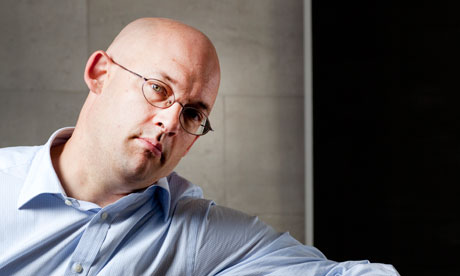The internet guru on the death of newspapers, why paywall will fail and how the internet has brought out our creativity – and generosity

If you are reading this article on a printed copy of the Guardian, what you have in your hand will, just 15 years from now, look as archaic as a Western Union telegram does today. In less than 50 years, according to Clay Shirky, it won't exist at all. The reason, he says, is very simple, and very obvious: if you are 25 or younger, you're probably already reading this on your computer screen. "And to put it in one bleak sentence, no medium has ever survived the indifference of 25-year-olds."
You have probably never even heard of Shirky, and until this interview I hadn't either. When I ask him to define what he does, he laughs, and admits that often when he's leaving a party someone will say to him, "What exactly is it you do?" His standard reply – "I work on the theory and practice of social media"– is not just wilfully opaque, but crushingly dreary, which is funny, because he is one of the most illuminating people I've ever met.
The people who know about Shirky call him an "internet guru". He winces when I say so – "Oh, I hate that!" – and it's easy to see why, for he is the very opposite of the techie stereotype. Now 46, his first career was in the theatre in New York, and he didn't even own a computer until the age of 28, when he had to be introduced to the internet by his mother. Arrestingly self-assured and charismatic, his conversation is warm and discursive, intently engaged yet relaxed – but it's his rhetorical fluency which bowls you over. The architecture of his argument is a Malcolm Gladwell-esque structure of psychological and sociological insight, analysing contemporary technology with the clarity of a historian's perspective and such authority that were he to tell you the sun actually sets in the east, you might almost believe him. At the very least, you'd probably want to – and if a guru is defined by the credulous deference he commands from others, then Shirky unquestionably qualifies. Within minutes I found myself hanging on his every word – despite being temperamentally hostile to almost everything he believes.
Shirky has been writing about the internet since 1996. As the chief technological officer for several web design companies during the 90s, he was quickly hired as a consultant by major media companies – News Corporation, Time Warner, Hearst – all curious about this new thing called the world wide web. In 2000, following "an intuition that the internet was turning social", Shirky turned to the fledgling phenomenon of online social networking – an obscure concept back then, but which has since evolved into MySpace, Facebook and Twitter, to become the web's primary purpose for billions of people all over the world. Shirky now teaches new media at New York University, and in 2008 published his first book, Here Comes Everybody: How Change Happens When People Come Together, which celebrated individuals' new power to communicate, organise and change the world via the web.
His predictions for the fate of print media organisations have proved unnervingly accurate; 2009 would be a bloodbath for newspapers, he warned – and so it came to pass. Dozens of American newspapers closed last year, while several others, such as the Christian Science Monitor, moved their entire operation online. The business model of the traditional print newspaper, according to Shirky, is doomed; the monopoly on news it has enjoyed ever since the invention of the printing press has become an industrial dodo. Rupert Murdoch has just begun charging for online access to the Times – and Shirky is confident the experiment will fail.
"Everyone's waiting to see what will happen with the paywall – it's the big question. But I think it will underperform. On a purely financial calculation, I don't think the numbers add up." But then, interestingly, he goes on, "Here's what worries me about the paywall. When we talk about newspapers, we talk about them being critical for informing the public; we never say they're critical for informing their customers. We assume that the value of the news ramifies outwards from the readership to society as a whole. OK, I buy that. But what Murdoch is signing up to do is to prevent that value from escaping. He wants to only inform his customers, he doesn't want his stories to be shared and circulated widely. In fact, his ability to charge for the paywall is going to come down to his ability to lock the public out of the conversation convened by the Times."
http://www.guardian.co.uk/technology/2010/jul/05/clay-shirky-internet-television-newspapers








No comments:
Post a Comment